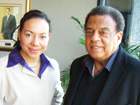 |
||||||||||
 |
||||||||||
|
An icon for a strapline On the 40th anniversary of the assassination of Martin Luther King, Iwan Russell Jones, one of the founding editors of Ship of Fools and the producer of a new documentary about MLK, reflects on King's costly commitment to Christian unrest by refusing to accommodate to the injustices of his time. I'm not sure what we had in mind when we chose "the magazine of Christian unrest" as the strapline for our new magazine. It was 1978 and in our post-theological college idealism, Simon Jenkins, Steve Goddard and I shared a vision not just for a different kind of Christian magazine, but for a different kind of Christianity – realistic, committed, funny, iconoclastic, intellectual, transcendent, satirical, world-affirming... Some shopping list. There'd already been two editions of Ship of Fools before I remember Simon saying that we needed a strapline to give a sense of what we were all about. But, as I understood it, it wasn't just a matter of where we were to position ourselves in the grubby marketplace, important though that might have been. The quest for a strapline was much more about our identity – the kind of theology we were interested in, the sort of faith we wanted to nurture and own. And somehow "Christian unrest" came into the frame. It was a throwaway line, as I remember it, jotted down on the back of a letter to Simon and Steve. They were living in bohemian Croydon, working on the magazine by day, peddling their cabaret act at night. I was hundreds of miles away in a dodgy tenement block in Aberdeen, still studying, my head full of Latin American revolutionaries and liberation theology. But it didn't seem to us that we were engaged in completely different enterprises. Far from it. We thought we were on the same track. The gags and the music, the poetry and the performance, belonged together with the theology and the ideas, the history and the mystery. We shared a sense of Christian mission – and, let's face it, of disenchantment, too. We'd all been brought up in different varieties of evangelicalism, and as we studied, joked, sang, played and argued our way through theological college, we found ourselves agreeing on what was wrong with it. Two Dylans had done their work on us: Thomas, with his unforgettable indictment of Bible-black, thou-shalt-not, Welsh nonconformity; and Bob, with his voice of prophecy, gloriously uncontaminated by pompous religion. We knew that we wanted to escape the clutches of grim deacons, with their pietistic, world-denying faith. But we craved illumination, inspiration, a word of beauty and truth for our generation. Despite its medieval origins, the title of the magazine itself had more to do with Karl Barth than Hieronymous Bosch. Simon had discovered that when Barth and his friends had been casting around for a title for their ground-breaking theological journal back in the early 1920s, Barth had ironically suggested it in preference to what he saw as Gogarten's presumptuous proposal of The Word. "Better to call it The Ship of Fools", he quipped, "than this idolatrous encumbrance". Thank you, Karl! A Barthian cast-off was more than good enough for us, and the good Ship was launched. But maybe the title Barth and his colleagues eventually chose – Between the Times – also left its mark, and perhaps somehow influenced our strapline, too. It suggested something temporary, impermanent, provisional – a protest against the present in the name of the not yet. Wherever it came from, there's no doubt that Christian unrest rang bells with us back in the 1970s – uneasy with the church, disillusioned with religious authority-figures, concerned over the direction of our lives. But I think that, for all of us, it also encapsulated a longing for something different: a form of discipleship that was revolutionary, world-changing, faithful to Christ, public. Did this mysterious form ever emerge in the pages of the original magazine, or indeed, in our lives? Is it even now lurking in the shadows of the bulletin boards and editorial pages, waiting to make itself known through the Net? Who knows... What I do know is that, like this Ship's voyage, my own journey of faith continues. And despite all my unrest, unease, disquiet, mental reservations, and downright bloody-mindedness, it feels very much as though, somehow or other, I have been carried along on it. Good people, good friends, continue to travel the same way, offering hope and encouragement. Food and sustenance have mysteriously appeared, like manna in the wilderness. I've been very conscious of this recently as I've worked on a film for BBC2 about Martin Luther King marking his assassination on 4th April 1968. Presented by campaigner and broadcaster Oona King, Martin Luther King: American Prophet explores a side to Martin Luther King that the world is in danger of forgetting: King the preacher, the raging prophet of God's judgment on America. For the fact is that, before he was a civil rights leader, King was a Baptist pastor and remained one to the end of his life. He described his religious calling as the key to his identity. It's been fascinating to delve into the role of the black church in shaping King's identity and oratory, and to meet and interview some of his closest associates in the movement. Andrew Young, King's right-hand man, was particularly keen to stress the centrality of King's theological vision as expressed in his work with the Southern Christian Leadership Conference (SCLC), the organisation he founded to take his message across the nation. "Our slogan was 'to redeem the soul of America'", Young told Oona. "But the idea of redemption – you don't get any more religious than that. That's a clearly religious word. And to redeem the soul of a nation – it's the religious concept of the 1960s". To redeem the soul of America. What a strapline! And as I've read and listened to King's sermons and speeches, I've become more and more convinced that he illumines and embodies the Ship of Fools strapline, too. King knew a thing or two about Christian unrest. Over the years everyone has learned about King's dream – his hopeful vision of an integrated and reconciled society delivered at the Lincoln Memorial in Washington in 1963. To some it's just an empty fantasy, lacking social and political reality. But King's dream needs to be understood in the light of his consistent teaching about struggle and resistance. He was no naïve idealist. From very early on in his ministry and leadership in Montgomery, Alabama, King spoke of the need to be "maladjusted". He knew what great value the society of his time put on psychological health and well-being, but he believed that Christian people had a fundamental calling not to conform to the powers of this world: I never intend to adjust myself to segregation and discrimination... I never intend to adjust myself to the tragic effects of the methods of physical violence and to tragic militarism... I call upon you to be as maladjusted as Amos who in the midst of the injustices of his day cried out in words that echo across the generations, "Let judgement run down like waters and righteousness like a mighty stream." Ten years later in his final presidential address to the SCLC, King was still making the same point when he called on his organisation to be characterised by "divine dissatisfaction". He wanted them, as Christians characterised by God's own standards, to resist the evil forces of their time: Let us be dissatisfied until every state capitol houses a governor who will do justly, who will love mercy and who will walk humbly with his God... Let us be dissatisfied until that day when nobody will shout 'White Power!' – when nobody will shout "Black Power!" – but everybody will talk about God's power and human power. Biblical maladjustment. Divine dissatisfaction. A more excellent way... there is an amazing consistency to King's preaching and leadership over the entire course of his ministry. Time and time again he called on people to resist the temptation to power and domination and violence – the way of the world – and to trust in God who is able to make "a way out of no way". For King, God's way is the way of the Exodus, the way of the cross. Nowhere is King's public theology of Christian unrest and resistance expressed with greater prophetic power and biblical authority than in the last sermon that he preached from his pulpit at Ebenzer Baptist Church in Atlanta on 4th February 1968. It's entitled "The Drum Major Instinct" and explores the story of two of Jesus' disciples and their bid for greatness when they ask him for special honours in the Kingdom of Heaven. King declared that the disciples shared with people the world over a definition of greatness based on what he called "the drum major instinct". It's a fundamental human trait: "a desire to be out front, a desire to lead the parade, a desire to be first." And it runs throughout society, encompassing everyone from individuals and churches, to corporations and governments, affecting everything from racial and class prejudice to economic greed and international conflict. As far as King is concerned, the drum major instinct is the driving force behind the "triple evils" of racism, poverty and war. It is the root of sin, the heart of the human condition. King is at his most prophetic and forthright in this sermon, warning America of the looming judgement of God – not just because of the war in Vietnam, but because of its arrogance and pride as a nation: God didn't call America to do what she's doing in the world now. God didn't call America to engage in a senseless unjust war as the war in Vietnam. And we are criminals in that war. We've committed more war crimes than almost any nation in the world, and I'm going to continue to say it. This is difficult, unpalatable stuff. In the US presidential race, candidates regularly invoke King's memory and moral authority, and no one more so than Barack Obama. But when Obama publicly criticised his own minister, Jeremiah Wright, for suggesting that at 9/11 some chickens had come home to roost, it's fair to say that, in this respect at least, Rev. Wright was closer to the tradition of Martin Luther King than Obama. For while King certainly didn't believe in terrorism or any kind of political violence, he did believe that America stands before a God who calls nations to account: "The God that I worship has a way of saying, 'Don't play with me... And if you don't stop your reckless course I'll rise up and break the backbone of your power.' And that can happen to America." In my view "The Drum Major Instinct" is one of the greatest sermons of the 20th century, maybe of all time. King, the leader of a black civil rights movement comprised of the children of slaves, shows how Jesus radically redefined greatness: "Whoever wants to become great among you must be your servant, and whoever wants to be first must be the slave of all." He called his own movement, and the whole of his nation, to redefine power and greatness, and to live by an entirely different set of values. Looking back across the Ship of Fools years, it's interesting to ask who our influences were in 1978. Where did that strapline come from? I honestly can't remember, and it probably doesn't matter anyway. But this I do know: if ever there was an icon of Christian unrest, Martin Luther King is it. Iwan Russell-Jones is the producer of Martin Luther King: American Prophet, which was screened on Saturday 29 March. |
|
|
||||||||||||||||||||||||||||||||||
 |
|||||||||||||||||||||||||||||||||||||







